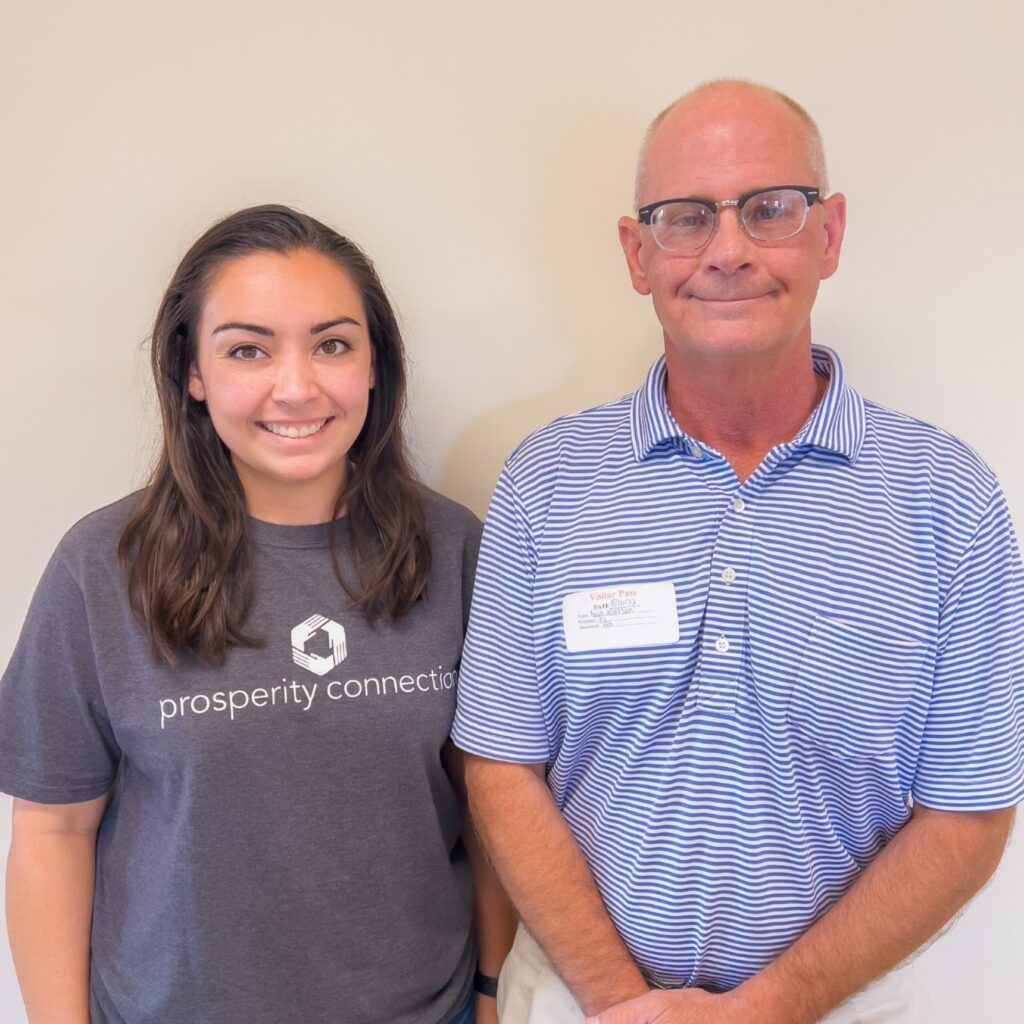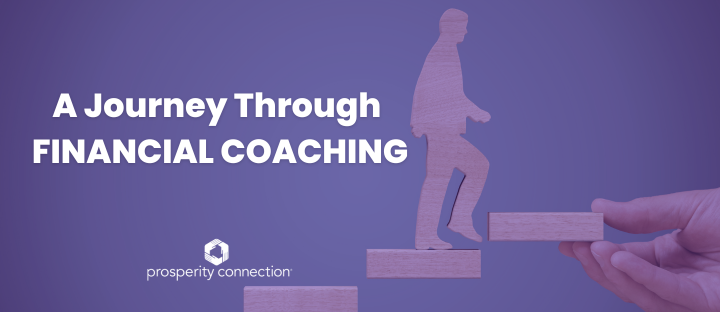Today we’re shining a spotlight on Rollin Woltjen, a long-time client of Prosperity Connection. Woltjen began his financial journey working with Sara Middendorf, now Director of St. Louis Builds Credit, back when she was a financial coach. Over the past 4 years, Woltjen has made tremendous progress. This interview covers his experiences and opinions after going through 1-on-1 financial coaching. Our goal is to demonstrate to you the coaching experience and the transformative potential of coaching for you. We hope Rollin’s long-term successes will serve as inspiration and motivation for anyone considering our financial coaching services.

Prosperity Connection: How did financial coaching change your views on managing your money?
Rollin Woltjen: It made me recognize that I needed to be more thoughtful with purchases and budgeting. It made me recognize I needed a budget. Even though I thought I was working within a budget, a mental budget did not help me the same way a written one does. A written budget helped me organize my thoughts and figure out where I wanted things to go and why. It made me focus on what I had to do.
I initially came because I wanted to work on my credit. I wanted to figure out what I owed, who I owed, and I wanted to pay it off. But I didn’t know how to start organizing. I needed help getting my thoughts into action and creating a plan. Sara helped me do that. I knew credit was the most important thing. And I knew the other things would come behind it as a byproduct. The whole thing was creating a financial balance because I didn’t have that in my life.
PC: What were some key takeaways from the financial coaching sessions that really stood out to you?
RW: I thought I was disciplined and I wasn’t. I didn’t understand the meaning of financial discipline. I am a lot more thoughtful about what I spend and where I spend it. I’m more on top of things. I have become comfortable with realizing that I can’t always do everything that I want to do, so I have to prioritize certain things. Also understanding what is underfoot is not the same thing as five years down the road; I can’t just react to what’s in front of me, I have to have a plan.
I needed to be comfortable. I needed to meet someone that I was comfortable with. Because I knew I wanted to do this. I knew some other guys that had worked with Sara in the past, while she was a financial coach. That’s how I was referred to her. They all had positive things to say about her. I was grateful that I met her before she started climbing the ladder to different roles and responsibilities. But I like to think of myself as “grandfathered” in because I still show up, I still respond, I still ask questions, and she takes time to explain things. I’m incredibly grateful to have that privilege.
PC: Have you started trying out any specific strategies or recommendations from financial coaching? How are they working so far?
RW: As soon as I walked out the door from our first meeting, I started applying the strategies. I don’t want to say that I have a spreadsheet, but I have things laid out percentage-wise where I want my money to go. I have two savings and two checking accounts today. My credit score allows me some flexibility and freedom to do things that I want to do that I wasn’t able to do. Structurally, I have money in places where I am comfortable having it. I budget accordingly, and I stay within that budget. Now I keep receipts so I know where I spent money. And I started eating in instead of out. There are just things I realized I needed to do to save money because my money was more important someplace else.
I also became comfortable asking for help. When I was drinking, I thought it was a weakness to ask for help. Today, I’m an advocate of asking for help. We all need help. Me especially. At some point, I had to trust somebody. I’m open to that today and this relationship [with Sara] has allowed that to develop and happen. So if she gave me a suggestion, I said “okay, what do you need from me?” It wasn’t complicated. Whatever I was asked to do, I did.
If you ask for help, sit down, and are patient it might seem a little overwhelming, but you can start seeing a little light at the end of the tunnel and not feel like you’re just in a cave by yourself anymore.
PC: Did the financial coaching help you pinpoint any areas where you could improve your financial habits or behaviors? If yes, what steps are you taking to address those areas?
RW: Yeah, I was spending a lot of money on things that I didn’t need to spend money on. Or I was spending money on things that I could cut back on. It made me more conscious of what was important to me financially.
The credit thing was obviously most important when I walked through the door. But this relationship has become more than just about credit scores. I have somebody in my corner. I have an advocate that’s willing to help. And when you’re alone or feel like you’re alone, it’s an immeasurable gift that you’re receiving. It makes all the difference in the world.
PC: Have you set any new financial goals or made changes to existing ones based on what you learned from the coaching? Could you share some examples?
RW: So, I am saving to buy a car right now. I have to be thoughtful about not putting too much money towards the car and I have to be disciplined with what I have agreed, in my own mind, to spend and to save. It’s not always easy but getting a different car is very important. So a lot of things I might otherwise do I’m not doing today because I need to get this. I take a percentage from every paycheck and I put it towards the car. Once that’s done, I’ll take what money I was applying to the car and put it toward two or three different areas.
PC: After the financial coaching is over, how do you plan on keeping up with the positive changes you’ve made?
RW: Well, that doesn’t apply because it’s not ending. But I feel more confident in making choices for myself and in my ability to put money in the right places. I’m more about long-term savings today. I am 55 and I need to start thinking about what happens when I’m 65, 70 years old. Goals change as we age. As we get older we have different needs and different wants. So I have to recognize that, stay on top of that, and adjust for that.
PC: Did you encounter any challenges while putting the advice from the financial coaching into practice? How did you handle them?
RW: No, I really didn’t, I just did it. Whatever happened, happened, and I was willing just to accept it and move on. The willingness of the person is everything in this. If the person is not willing to do this, then you’re wasting your time. You’re planting a seed for a potential future down the road, but it’s kind of like quitting an addiction; it’s up to the person to make the change for themselves. Not for a loved one, not because you’re going to lose a job. You have to be all in for your own self. And I was totally committed to doing that. Whatever I was told to do, I did it.
If there was a challenge it may be the fact that I don’t work a set number of hours, I don’t make a set salary. It doesn’t weigh on me; I wish it was more, but I have more balance today. I’m not freaked out about things like that anymore. I’m just more comfortable with things now, I don’t lose sleep over stuff like that. And with the new car, I’m going to try to do food delivery so I can supplement that loss.
PC: Were there any helpful resources or tools that the financial coach suggested to manage your finances better?
RW: Getting a savings account and a checking account would be a good start. I had started a checking account, but I made changes by getting a credit builder loan with St. Louis Community Credit Union and an account with Ally. Those were direct suggestions from Sara.
PC: Has your perception of financial security and financial health changed since you had coaching sessions?
RW: I am less intimidated by the whole thing. It’s a necessary evil. In a perfect world, we’d all be running around naked and nothing would cost any money. But that’s not happening anytime soon.
PC: How has financial coaching made you feel more confident about your financial future?
RW: It’s made me feel more confident about making choices for myself. It’s made me more aware of being an adult. It helped me grow up and take responsibility for myself. In the past, I relied on family members for help, and that was frustrating for them. It’s part of the growth and balance in my life. I just feel more comfortable and confident and less stressed out.
PC: If someone else is thinking about getting financial coaching, what advice would you give them based on your own experience?
RW: Come in for a visit, and just listen. Don’t be intimidated. You’re not alone even if you think you’re alone. I thought I was alone. I thought I was the only one that had problems. But the problems are just personal. I got really lucky. Sara is great. I walked in as a piece of clay, and Sara helped mold me. I helped myself. She helped me. I get emotional because I can’t emphasize enough that in recovery, especially early recovery, having anybody who is willing to help is a big deal. I was miserable and didn’t know how to ask for help.
This [relationship] has gotten very personal for me. It’s a gift. And I’m incredibly grateful for it. It’s made a huge change and impacted me more than I ever thought it would. I’m just grateful for Prosperity Connection. I am a different person.
To anyone who is struggling, this is a wonderful group of people to get involved with. But you have to do the work and it doesn’t happen overnight! You’ve got to keep putting one foot in front of the other and don’t quit. And if you feel overwhelmed, call your coach. They’ll help. Mine did.
We hope you can see that Mr. Woltjen’s financial journey has benefited greatly from his 1-on-1 coaching experience. Hearing stories like this, from our clients, fills us with such joy! And we are so grateful to everyone who trusts us in this process. If you’d like to embark on your journey to financial wellness, you can start here. We hope you’ll take Rollin’s advice and come in for a visit soon!

